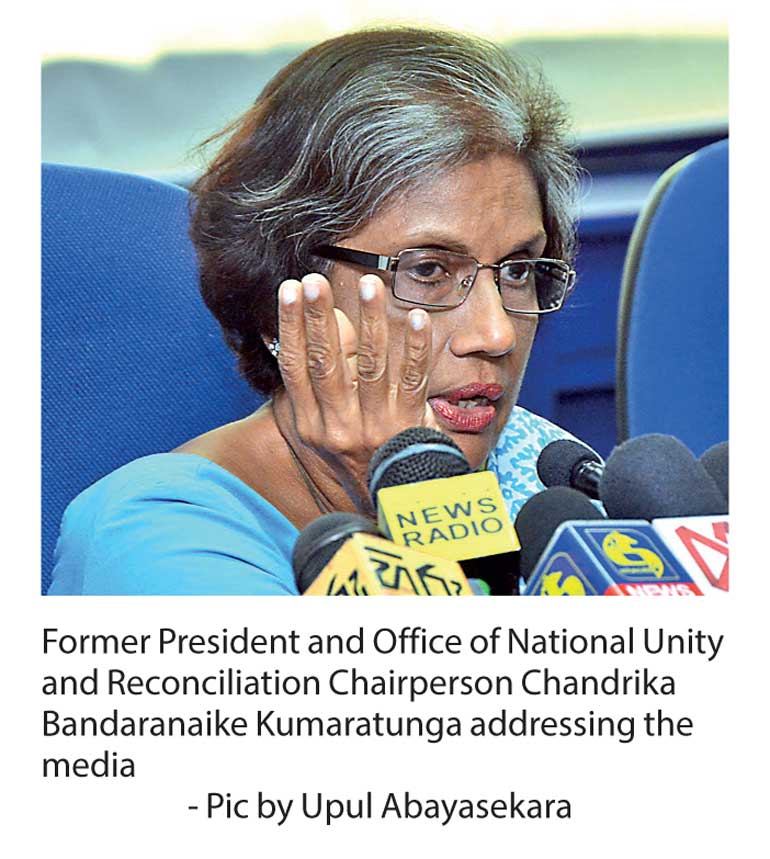Thursday Feb 19, 2026
Thursday Feb 19, 2026
Wednesday, 10 May 2017 00:10 - - {{hitsCtrl.values.hits}}
 By Himal Kotelawala
By Himal Kotelawala
Presenting the recently Cabinet-approved National Reconciliation Policy to the media, former President and Chair of the Office for National Unity and Reconciliation (ONUR) Chandrika Bandaranaike Kumaratunga said that reconciliation will only serve to strengthen national security rather than compromise it.
Fielding questions at a special press conference held in Colombo, Kumaratunga said the Security Council continues to meet regularly with the participation of the President, the Prime Minister and the tri-forces commanders to discuss matters relating to national security and, contrary to what she says are alarmist statements made by parties with vested interests, there is no problem whatsoever in that regard.
“What reconciliation does is prevent future threats to national security from cropping up. If we don’t do this now, there could be another war in the future,” warned Kumaratunga.
She said reconciliation alone will ensure that there will be no opportunity for separatist causes.
“Only reconciliation will prevent another Elam being demanded,” she said, reiterating that reconciliation will only serve to ensure and strengthen national security.
Asked to comment on allegations of prosecuting war heroes, the former President said that the soldiers currently under investigation were apprehended not for their part played in the war but for their alleged involvement in the extrajudicial killings of journalists and political opponents of the previous regime.
Some of those soldiers were used by officials to target their opponents, she said, adding that being a soldier alone was not enough of a reason not to arrest an individual accused of wrongdoing. When asked why the said officials are not being arrested instead, Kumaratunga said that the soldiers who carried out the orders needed to be taken into custody in order to gather evidence admissible in court, against those who gave said orders.
Elaborating on the new National Reconciliation Policy, Kumaratunga said that some of the major suggestions contained in the document are already in the process of being implemented by the ONUR in conjunction with other relevant ministries.
Special interactive programs are underway, she said, to educate children from different parts of the country on the importance of reconciliation. A second phase of these programs will include similar awareness programs for adults as well as members of the clergy. Arts and culture too will be used, she said, to build bridges and promote reconciliation.
“We also talk about the need for a new constitution or an amended constitution to guarantee the rights of the minorities. That is in the process. It is a bit slow, but it is going forward, we hope. That’s in the hands of the Parliament and the Government,” said Kumaratunga.
Responding to a question posed by Daily FT on comments repeatedly made by Sri Lanka Freedom Party (SLFP) ministers on a decision by the party to not support any amendment to the constitution that will require a national referendum, Kumaratunga said: “I don’t know whether it’s a statement from the SLFP or individuals of the SLFP, because to my knowledge the SLFP has not taken any such decision formally. But why such individuals talk like that, I don’t know, I cannot explain. I have protested at this and I don’t agree with them.”
According to a statement issued by ONUR, the National Reconciliation Policy will “serve as the State policy on reconciliation” and “provide direction to the process of national reconciliation in Sri Lanka” and provide a “guiding framework to all stakeholders working on reconciliation in order to achieve coherence in reconciliation initiatives.
The communique further states that the policy is set to fill a longstanding vacuum due to the absence of a consolidated national policy on reconciliation and will aim to satisfy the need of the country for an overarching vision on reconciliation and a broad, coherent framework to steer and direct the process of national reconciliation. The policy, according to the ONUR, aims to “bridge the gap” between the several reconciliation initiatives already underway.
The policy spells out a set of policy principles defined as a set of actionable principles and long-term goals that will “form the basis for making rules and guidelines, and to provide overall direction to planning and development for national reconciliation.”
According to the ONUR, these include, among other things, equality, human rights, justice and rule of law, transitional justice, inclusivity and diversity, sustainable development and civic consciousness. Among the areas identified as being critical to implementing reconciliation programs are conflict sensitivity, cross-cultural awareness, victim-centredness, gender responsiveness, foresight and innovation, leadership and sustainability, efficiency and effectiveness, coordination and complementary, clear and consistent communication.